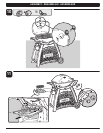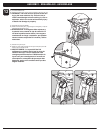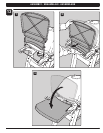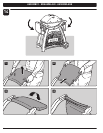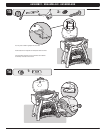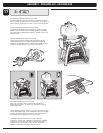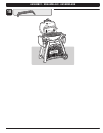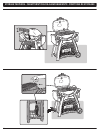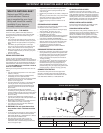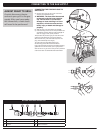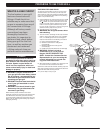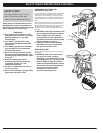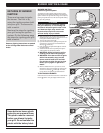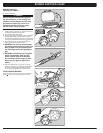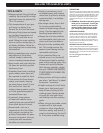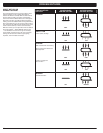Special offers from our partners!

Find Replacement BBQ Parts for 20,308 Models. Repair your BBQ today.

Buy Weber Grill Parts. It couldn't be easier. Find your Weber parts here.

WWW.WEBER.COM
®
21
IMPORTANT INFORMATION ABOUT NATURAL GAS
TYPICAL PIPE INSTALLATION
3 4 5 6 7
2
1
This is a typical installation of a Weber
®
natural gas grill. Local codes may require different installations.
INSIDE HOUSE OUTSIDE HOUSE
1 Gas supply 3 Quick-disconnect 5 Reducing coupling 7 Locking shutoff
2 Shutoff 4 3/8" pipe nipple 6 1/2" pipe nipple
WHAT IS NATURAL GAS?
Natural gas (NG) is often
called methane. Natural
gas is supplied by your local
utility and should be readily
available if your house is
already heated with gas.
NATURAL GAS — THE BASICS
There are various guidelines and safety factors that
you need to keep in mind when using natural gas (NG).
Carefully follow these instructions before using your
Weber
®
gas grill.
• Your natural gas grill is factory built to operate using
natural gas only. Never attempt to operate your grill on
gases other than the type specified on the grill rating
plates.
• This Weber
®
gas grill is designed for natural gas
only. Do not use liquid propane (LP) bottled gas. The
valves, orifices and hose are for natural gas only.
• Before using an NG grill, you need to make sure that
the branch supply line from your house to your grill is
properly installed.
• Not for use by children.
PIPING SPECIFICATIONS
Contact your local municipality for building codes
regulating outdoor gas grill installations. In the absence of
local codes, installation must conform to the latest edition
of the National Fuel Gas Code: ANSI Z223.1/NFPA 54, or
CAN/CGA-B149.1, Natural Gas and Propane Installation
Code. WE RECOMMEND THAT THIS INSTALLATION BE
DONE BY A PROFESSIONAL.
Following are some general requirements taken from the
code(s).
• This grill is designed to operate at 4" of water column
pressure (.1444 psi).
• A manual shutoff valve must be installed outdoors,
immediately prior to the quick-disconnect.
• An additional manual shutoff valve should be installed
indoors in the branch fuel line, in an accessible
location near the supply line.
• The quick-disconnect connects to a 3/8" NPT thread
from the gas source. The quick disconnect fitting
is a hand-operated device that automatically shuts
off the flow of gas from the source when the grill is
disconnected.
• The quick-disconnect fitting can be installed
horizontally or pointing downward, but never pointing
upward. Installing it with the open end pointing upward
can result in water and debris collecting in the quick-
disconnect fitting.
• The dust covers (plastic plugs supplied with your
grill) help keep the open ends of the quick-disconnect
fitting clean while disconnected.
• When making connections, only use pipe compound
that is resistant to the action of natural gas.
• The outdoor connector must be firmly attached to
rigid, permanent construction.
m WARNING: Do not route the ten-foot
hose under a deck. The hose must be
visible.
• For the correct size and length of gas line piping, refer
to the latest edition of the National Fuel Gas Code:
ANSI Z 223.1/NFPA 54, or CAN/CGA-B149.1, Natural
Gas and Propane Installation Code.
• Gas piping may be copper tubing, type K or L;
polyethylene plastic tube, with a minimum wall
thickness of .062"; or standard weight (schedule 40)
steel or wrought-iron pipe.
• Copper tubing must be tin lined if the gas contains
more than 0.3 grams of hydrogen sulfide per 100
cubic feet of gas.
• Plastic tubing is suitable only for outdoor, underground
use.
• Gas piping in contact with earth, or any other material
which may corrode the piping, must be protected
against corrosion in an approved manner.
• Underground piping must have a minimum of 18"
cover.
STORAGE AND/OR NONUSE
For grills that have been stored or left unused for a while,
it is important to follow these guidelines:
• The gas must be turned off at the natural gas supply
when the Weber
®
gas grill is not in use.
• If storing the Weber
®
gas grill indoors, first
DISCONNECT the gas supply.
• The Weber
®
gas grill should be checked for gas leaks
and any obstructions in the burner tubes before it is
used. (Refer to “ANNUAL MAINTENANCE.”)
• Check that the areas under the control panel and the
slide-out grease tray are free from debris that might
obstruct the flow of combustion or ventilation air.
• The spider/insect screens should also be
checked for any obstructions. (Refer to “ANNUAL
MAINTENANCE.”)
PRESSURE TESTING GAS SUPPLY
• Disconnect your Weber
®
gas grill when the gas supply
is being tested at high pressures. This appliance and
its individual shutoff valve must be disconnected from
the gas supply piping system during any pressure
testing of that system at test pressures in excess of
1/2 psig (>3.5 kPa).
• Turn off your Weber
®
gas grill when the gas supply is
being tested at low pressures. This appliance must
be isolated from the gas supply piping system by
closing its individual manual shutoff valve during any
pressure testing of the gas supply piping system at test
pressures equal to or less than 1/2 psig (≤3.5 kPa).
CONNECTION TESTING
All connections and joints must be thoroughly tested
for leaks in accordance with local codes and all listed
procedures in the latest edition of the National Fuel Gas
Code: ANSI Z223.1/NFPA 54, or CAN/CGA-B149.1.
US INSTALLATION CODES
Installation must conform with local codes or, in the
absence of local codes, with either the National Fuel Gas
Code, ANSI Z223.1/NFPA 54, Natural Gas and Propane
Installation Code, CSA B149.1; or Propane Storage and
Handling Code, B149.2; or the Standard for Recreational
Vehicles, ANSI A 119.2/NFPA 1192, and CSA Z240 RV
Series, Recreational Vehicle Code, as applicable.
MEXICO INSTALLATION CODES
If there are local codes that apply to portable gas grills,
you must comply with the latest edition of NOM.
CANADIAN INSTALLATION
These instructions, while generally acceptable, do not
necessarily comply with the Canadian Installation codes,
particularly with piping above and below ground. In
Canada, the installation of this appliance must comply
with local codes and/or the latest edition of Standard
CAN/CGA-B149.1 (Natural Gas and Propane Installation
Code).



